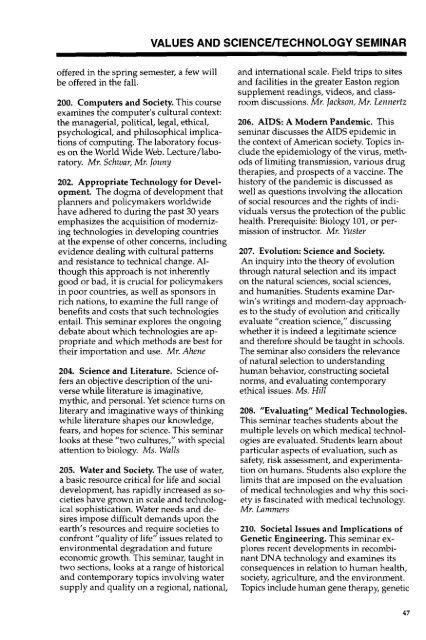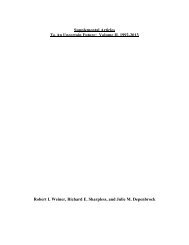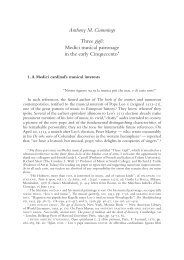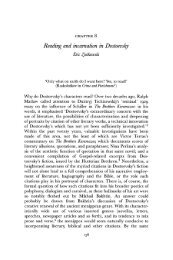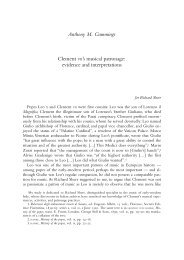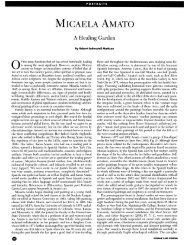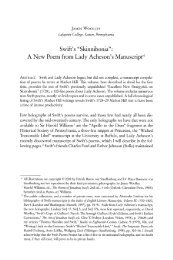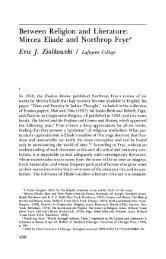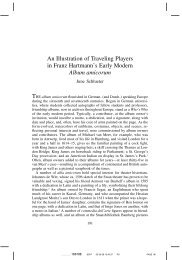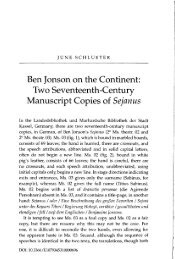courses of instruction - Lafayette College
courses of instruction - Lafayette College
courses of instruction - Lafayette College
Create successful ePaper yourself
Turn your PDF publications into a flip-book with our unique Google optimized e-Paper software.
<strong>of</strong>fered in the spring semester, a few will<br />
be <strong>of</strong>fered in the fall.<br />
200. Computers and Society. This course<br />
examines the computer's cultural context:<br />
the managerial, political, legal, ethical,<br />
psychological, and philosophical implica<br />
tions <strong>of</strong> computing. The laboratory focus<br />
es on the World Wide Web. Lecture/labo<br />
ratory. Mr. Schwar, Mr. Jouny<br />
202. Appropriate Technology for Devel<br />
opment. The dogma <strong>of</strong> development that<br />
planners and policymakers worldwide<br />
have adhered to during the past 30 years<br />
emphasizes the acquisition <strong>of</strong> moderniz<br />
ing technologies in developing countries<br />
at the expense <strong>of</strong> other concerns, including<br />
evidence dealing with cultural patterns<br />
and resistance to technical change. Al<br />
though this approach is not inherently<br />
good or bad, it is crucial for policymakers<br />
in poor countries, as well as sponsors in<br />
rich nations, to examine the full range <strong>of</strong><br />
benefits and costs that such technologies<br />
entail. This seminar explores the ongoing<br />
debate about which technologies are ap<br />
propriate and which methods are best for<br />
their importation and use. Mr. Ahem<br />
204. Science and Literature. Science <strong>of</strong><br />
fers an objective description <strong>of</strong> the uni<br />
verse while literature is imaginative,<br />
mythic, and personal. Yet science turns on<br />
literary and imaginative ways <strong>of</strong> thinking<br />
while literature shapes our knowledge,<br />
fears, and hopes for science. This seminar<br />
looks at these "two cultures," with special<br />
attention to biology. Ms. Walls<br />
205. Water and Society. The use <strong>of</strong> water,<br />
a basic resource critical for life and social<br />
development, has rapidly increased as so<br />
cieties have grown in scale and technolog<br />
ical sophistication. Water needs and de<br />
sires impose difficult demands upon the<br />
earth's resources and require societies to<br />
confront "quality <strong>of</strong> life" issues related to<br />
environmental degradation and future<br />
economic growth. This seminar, taught in<br />
two sections, looks at a range <strong>of</strong> historical<br />
and contemporary topics involving water<br />
supply and quality on a regional, national,<br />
VALUES AND SCIENCE/TECHNOLOGY SEMINAR<br />
and international scale. Field trips to sites<br />
and facilities in the greater Easton region<br />
supplement readings, videos, and class<br />
room discussions. Mr. Jackson, Mr. Lennertz<br />
206. AIDS: A Modern Pandemic. This<br />
seminar discusses the AIDS epidemic in<br />
the context <strong>of</strong> American society. Topics in<br />
clude the epidemiology <strong>of</strong> the virus, meth<br />
ods <strong>of</strong> limiting transmission, various drug<br />
therapies, and prospects <strong>of</strong> a vaccine. The<br />
history <strong>of</strong> the pandemic is discussed as<br />
well as questions involving the allocation<br />
<strong>of</strong> social resources and the rights <strong>of</strong> indi<br />
viduals versus the protection <strong>of</strong> the public<br />
health. Prerequisite: Biology 101, or per<br />
mission <strong>of</strong> instructor. Mr. Yuster<br />
207. Evolution: Science and Society.<br />
An inquiry into the theory <strong>of</strong> evolution<br />
through natural selection and its impact<br />
on the natural sciences, social sciences,<br />
and humanities. Students examine Dar<br />
win's writings and modern-day approach<br />
es to the study <strong>of</strong> evolution and critically<br />
evaluate "creation science," discussing<br />
whether it is indeed a legitimate science<br />
and therefore should be taught in schools.<br />
The seminar also considers the relevance<br />
<strong>of</strong> natural selection to understanding<br />
human behavior, constructing societal<br />
norms, and evaluating contemporary<br />
ethical issues. Ms. Hill<br />
208. "Evaluating" Medical Technologies.<br />
This seminar teaches students about the<br />
multiple levels on which medical technol<br />
ogies are evaluated. Students learn about<br />
particular aspects <strong>of</strong> evaluation, such as<br />
safety, risk assessment, and experimenta<br />
tion on humans. Students also explore the<br />
limits that are imposed on the evaluation<br />
<strong>of</strong> medical technologies and why this soci<br />
ety is fascinated with medical technology.<br />
Mr. Lammers<br />
210. Societal Issues and Implications <strong>of</strong><br />
Genetic Engineering. This seminar ex<br />
plores recent developments in recombi-<br />
nant DNA technology and examines its<br />
consequences in relation to human health,<br />
society, agriculture, and the environment.<br />
Topics include human gene therapy, genetic


